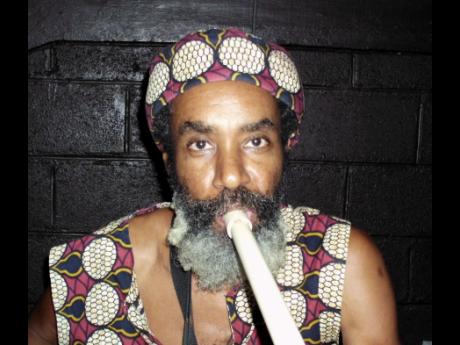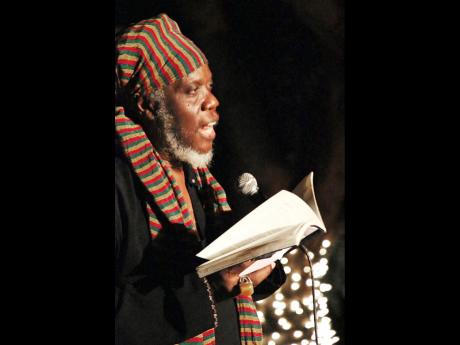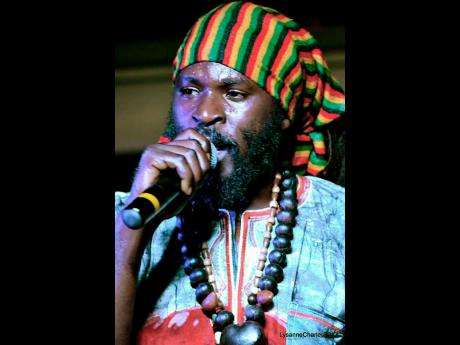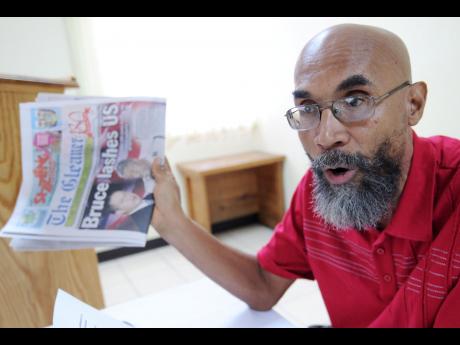Verse for Tivoli
Poetry features heavily at event ahead of Enquiry
Protest poetry has always been a part of poetry. Literature reflects life, after all.
So, along with verse about the glow of the moon, twinkle of stars, joys of love and its link to the red, red rose, poets have inveighed against egregious social conditions and man's general inhumanity to man.
The tradition continued at the University of the West Indies (UWI), Mona, on Sunday. At the behest of social activist Lloyd D'Aguilar, convener of the Tivoli Committee, several poets performed in support of the committee's work. That work is to help citizens of Tivoli Gardens recover from the events of May 2010 - usually called either The Tivoli Massacre or, more innocuously, The Tivoli Incursion - which saw, according to D'Aguilar, 73 to 200 people killed by the security forces.
Specifically, said D'Aguilar, the committee wants to make the imminent Commission of Enquiry into the Incursion be really useful, and not the "whitewash" he thinks it's heading to be. He wants the four persons with "command responsibility" during the period - the prime minister, minister of national security, head of the Jamaica Defence Force( JDF), and commissioner of police - tried in the International Criminal Court for their handling of the matter.
Much that went on at Sunday's meeting in the Neville Hall Lecture Theatre (N1) is outside the purview of this column, which focuses on the performing arts. So let's return to the poets. There were seven of them - Dr Michael Abrahams, Mutabaruka, M'Bala, Mel Cooke, A-dZiko Simba Gegele, Ras Takura and Abbebe Payne. Additionally, singjay Moeish, at the function primarily to promote her album which will be launched next Thursday, performed a couple of her pieces.
By way of an introduction to his poetry, Abrahams said "what happened in Tivoli affected me deeply. I keep wondering why so many don't care. I've written more about Tivoli than about any other issue."
LIES, HALF-TRUTHS
In his first poem, Tivoli One Year Later, Abrahams sketched the events and commented that he hears lies and half-truths but there has been "no justice for the victims." Another poem reflected the ambivalence Abrahams admitted towards the police: "It's hard to be a cop," he said, "but the fact is that too many people are killed by the police force."
Abrahams performed his pieces, pacing restlessly across the small stage, microphone in his left hand, right hand gesturing forcefully, eyes continually shifting, taking in the audience.
Mutabaruka was calmer. He stayed behind the lectern and read from one of his books.
"We write dese poems a long time ago," he explained, but they remain relevant His first poem was Yu Think a Suh it a go Guh in which the persona declares "we a go bun down Babylon" because of the continuing violence against the youth. Another poem, Call Me No Poet Nor Nuttin Like Dat, was in response to poems about "lovers and lilies and romance" when, in Mutabaruka's opinion, poets should be writing about babies dying, food shortages and abortion.
"I wonder if I have to write more poems," he told the audience, or, because the message remains relevant, simply keep repeating them over and over again.
The third poet, M'Bala, sat on a stool surrounded by about seven musical instruments, most of which he played as he recited from memory. The pieces included two about the harm of listening to the news - On My Way to Wearing a Permanent Screw - ("because the tears from last night's news have etched a bitter, bitter line") and Static, (about the difficulty humans have communicating with each other over the static caused by the news).
Others were Enemy, about the mixed-race persona filtering from his/her blood that of unwanted races, and Parking Emancipation, a poem inspired by a newspaper photograph of a little girl relieving herself on a gully bank.
INTIMATE CONVERSATION
Cooke chose yet another way of communicating with his audience. He pulled a chair close to the edge of the platform, sat and then leaned forward as if to have a really intimate conversation. Because of his 'let's reason together" style, the fact that he read from a cell phone hardly hampered his interaction.
His subjects included the difficulty of expressing deep emotion in words, the fact that since the advent of INDECOM, both the number of killings of the police and by the police has gone down, the apparent acceptance by international media that the death of black people matters less than the death of white people and the connection between chaos and creativity.
A-dZiko danced as she dramatised her poems, M'Bala accompanying her on the talking drum. Her first poem, It Is Too Late For This Concern, seemed pessimistic (too late, she said. "for the wrapping around of bright yellow tape"). However, in her second, A-dZiko declared "we got the nerve to overcome ...", "we out to win ...", "we bounce back."
Ras Takura first advised Jamaicans to put down the gun and "farm up de ground," and then paid tribute to black woman, "the authentic manifestation of Mother Earth".
Payne, another Rastafarian, advised people to take responsibility for themselves and get out of the ghetto. Blacks are born leaders, he said.
After the event, I asked D'Aguilar why he had included poets in the meeting. He said "poets are very powerful people. They speak the language of the people. They can go right to the heart of the people and help me to articulate what I want to say."
About D'Aguilar's comment, M'Bala said "the poet is the voice of the conscience. We get inside of things".
A-dZiko opined "we speak from the emotions, about the spiritual."
On Sunday, the audience's enthusiastic response to the poets indicated that they did help D'Aguilar to transmit his message.







